Our Favorite Movie Moments of 2014
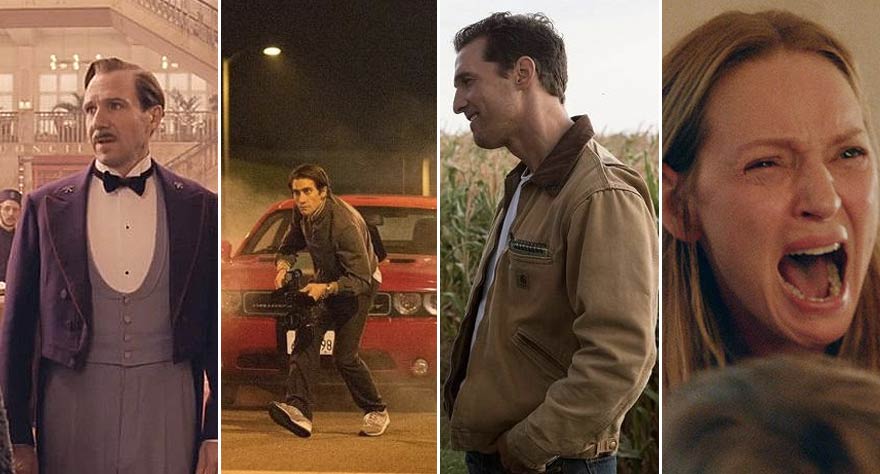
Sometimes a single scene can elevate a good film into a great one. Other times a moment can single-handedly redeem a film, or save it from the brink of disaster. Like last year, 2014 had plenty of terrific scenes and moments out of the many films released over the last twelve months. Before we reveal our big list of 2014’s best films, along with plenty of other year-end goodies, a few of the Way Too Indie staff put together this list of our favorite movie moments of 2014. Whether these scenes made us laugh, cry, creeped us out or got our hearts racing, they’ll certainly stay in our brains long after the year is over.
Warning: Some of these descriptions contain spoilers.
The Babadook – Reading The Book
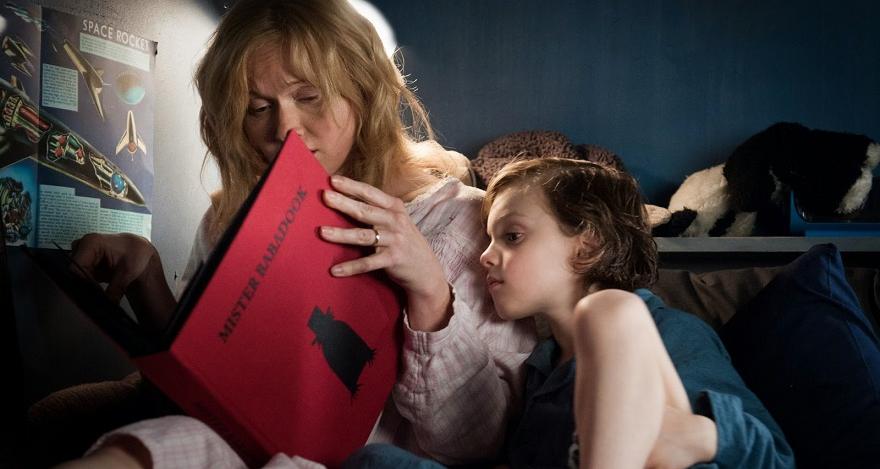
The best horror film of the year’s scariest scene doesn’t involve a murder, a monster or a bump in the night, but a single mother reading a children’s book to her troubled son. The book that releases Mister Babadook is a brilliant piece of design. Beautifully drawn and written, the book’s pop-ups start out as delightful before becoming more elaborate and psychotic. The further along Amelia and young Samuel get, the nastier it becomes, and the the more it sucks in the viewer. Suddenly, one might realize that this isn’t just a general warning, but a true foreshadowing of events to come. The book’s narrative directly impacts our expectations up until the end, making us truly dread what’s coming. The Babadook has so much more going for it than a typical haunted house horror flick, but this quiet scene is its scary height. [Aaron]
Blue Ruin – In The Trunk
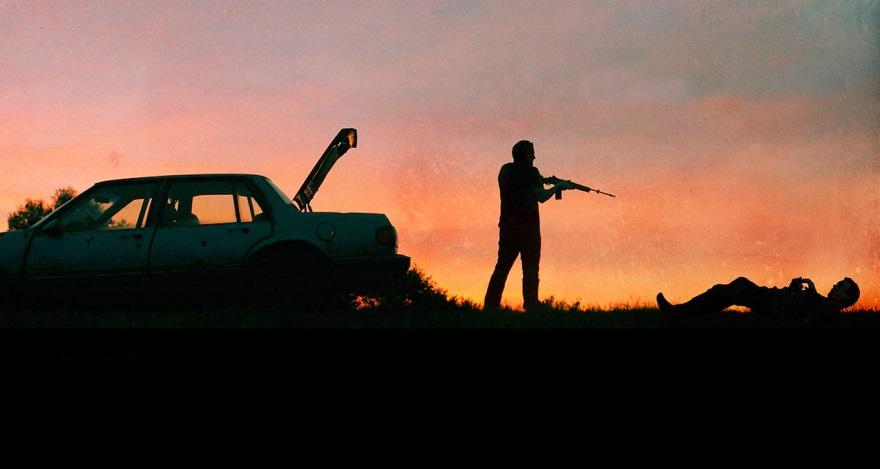
Jeremy Saulnier’s fantastic debut feature, a moody, bluesy, violent deconstruction of the revenge thriller, is at its best when it’s also darkly comedic. No scene mixes the two better than when Dwight has his second of three confrontations with the Cleland family. By this point Dwight is already established as being completely out of his element, but now he’s been introduced to a firearm by a former friend he meets in the previous scene. Once Dwight opens the trunk to come face-to-face with Teddy, it is difficult to predict what exactly will happen, but it certainly won’t be good. Dwight is trying his best to end the blood feud here, not wishing to harm Teddy but nervously willing to use deadly force. Pettiness, or perhaps some effed up fate, won’t let that happen, however, especially after Dwight is tricked and overpowered by his hostage. I won’t spoil what happens next, but the scene ends on a perfect laugh to break this tension – first, horror over the remnants of a violent act, followed by a simple, yet philosophical decree: “That’s what guns do.” [Aaron]
Enemy – Spiders!
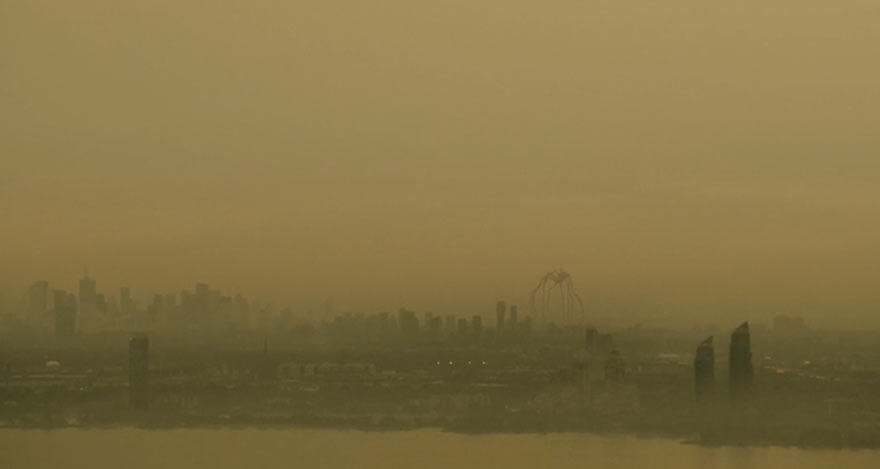
Denis Villeneuve’s deliberately confusing Enemy, an adaptation of José Saramago’s novel “The Double,” really loves to throw spider imagery around. The opening scene has a group of men watching a woman crush a spider with her foot. A shot of streetcar cables looks awfully similar to a spider web. And to make matters worse for arachnophobes, the protagonist repeatedly has nightmares involving disturbing, Cronenbergian images of giant spiders terrorizing Toronto. A shot of the Toronto skyline goes from ominous to severely creepy once you notice the massive spider towering over the city’s skyscrapers in the background. An image of a naked woman with a spider’s head comes straight out of a Lynchian nightmare. And oh yeah, that ending. I’m not gonna spoil it (and if you don’t want it spoiled, don’t go sniffing around on Google either). People have already called it one of the scariest endings to a movie, and while I don’t agree with that declaration, I don’t blame anyone for getting freaked out by those final frames. [C.J.]
Force Majeure – The Avalanche & Arguing In Bed
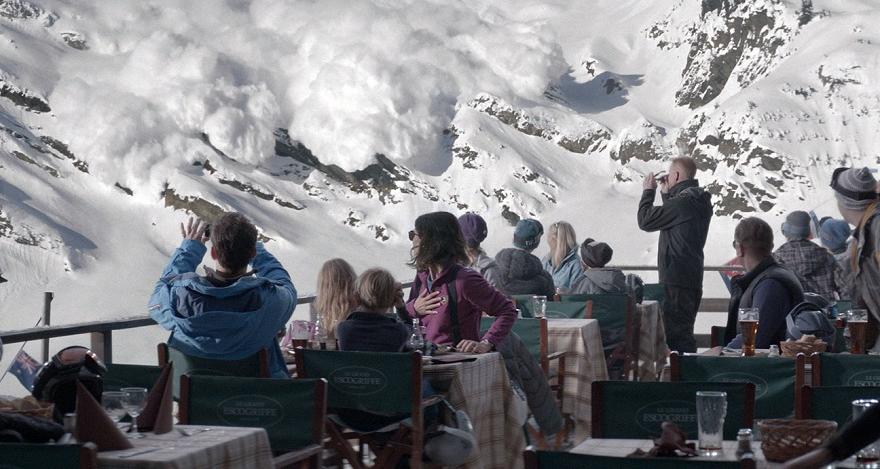
If someone were to explain the plot of Force Majeure outright, they would probably give the wrong impression. A well-to-do family’s vacation in paradise quickly upended by a natural disaster sounds more like The Impossible than its internalized examination of masculinity and familial responsibility. Without nailing the pivotal avalanche scene, there is no film, no matter how great the remainder may be. As the Swedish family enjoy their casual lunch on the side of a mountain, with a view as tasty as the expensive cuisine, someone notices a controlled avalanche building on the slopes in the distance. In the course of only a few minutes, the scene twists and turns as the blinding powder hurdles toward them. Is this truly a controlled blast, or something out of control? We can see the characters working through thoughts from the serene to the horrified, leading to the ultimate actions which set the film’s second and third acts. It perfectly connects with the plot and themes of the entire film, but could stand on its own as a wonderful short film that can adequately hit on these themes all on its own. The avalanche is beautifully shot in a single long take, a perspective allowing the intense background and the entire lunch crowd to be viewed together. Shoot it any other way, and the scene just wouldn’t build as organically as it does. [Aaron]
The avalanche at the crux of Force Majeure does more than test the relationship between the film’s lead couple. Tomas and Ebba’s concerns become the subject of several conversations, including a notable one between themselves and Tom’s full-bearded friend Mats (Kristofer Hivju) and Mats’ 20-year-old date Fanni (Fanni Metelius). At the end of an awkward night together, Mats and Fanni return to their room where the night of bickering has only just begun. Mats attempts to empathize with his friend, but Fanni suggests that, were he to be caught in a similar situation, Mats would have likely ran from the avalanche rather than returned to help his children. What Fanni means as an innocuous observation leads to the couple debating in bed throughout the night. Lying next to one another, Fanni attempts to explain her thinking while Mats continues to assert his masculinity, offended at her insinuation. As the lights keep flicking on and off, with the couple finishing and reopening their argument, the uncomfortable familiarity of getting stuck in an argument headed nowhere creeps in. This scene is one of the most relatable, hilarious moments of the year. [Zachary]
Gone Girl – Consummation
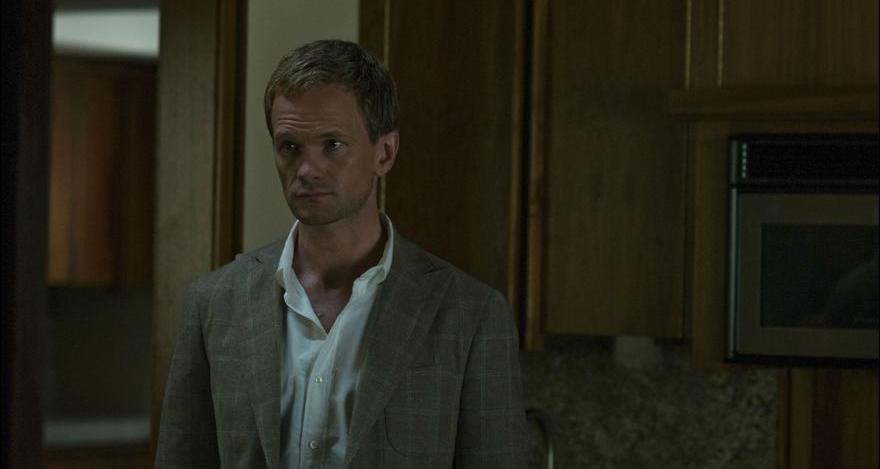
A warning: Readers shouldn’t be reading this if they haven’t seen David Fincher’s Gone Girl. But assuming those of you reading are film lovers who have already seen this fantastic modern satire, please proceed. Amy (Rosamund Pike) emerges halfway into the film as the antithesis to the cool girl, but then finds herself in a bit of a pickle with her ex-stalker Desi (Neil Patrick Harris). How she gets rid of him is one of my favorite moments in 2014. Fincher, working in tandem with regular collaborators Trent Reznor and Atticus Ross (music), Kirk Baxter (editing) and Jeff Cronenweth (cinematography), manages to shine a whole new light on Pike’s multifaceted performance; that of the psychotic, murderous, dangerously intelligent bitch. Luring Desi into the bedroom, Amy’s plan to “cry rape” works perfectly in the film’s highest dramatic moment when she slits Desi’s throat while he’s inside her, the blood spurting all over her body and Desi’s thousand dollar sheets, shown through slow-burning black fades and ominous chords. I’m pretty sure my irises expanded as if I had just been injected by a drug, and as shocking as it was, I couldn’t help but smile and admire all the artistry behind the creation. If I were to anatomize scenes from 2014, this would be the first. [Nik]
The Grand Budapest Hotel – Lobby Boy Interview
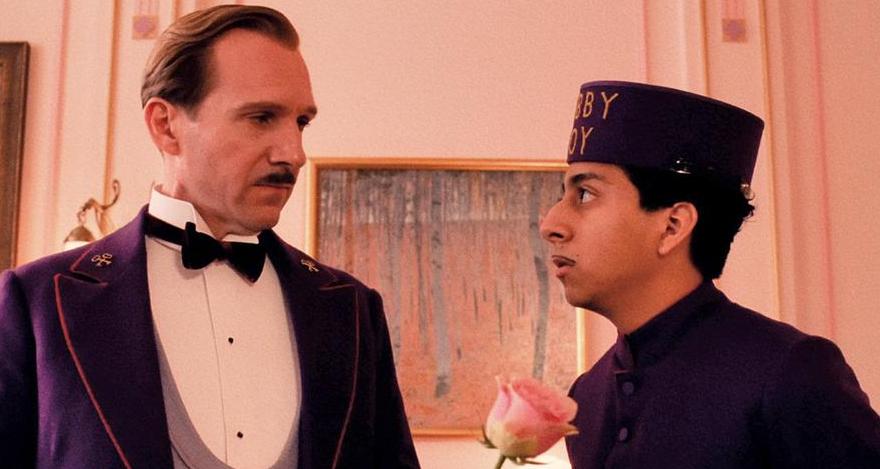
There are many, many wonderfully spiffy and affably hilarious moments to choose from in Wes Anderson’s The Grand Budapest Hotel. I equally love loads, but the one I’d like to signal out here is Zero’s (Tony Revolori) interview with M. Gustave (Ralph Fiennes)—centered around the cornerstone of the film’s marketing question, “Why do you want to be a lobby boy?” After shouting out various demands and instructions, Gustave realizes that he has no clue who this little earnest boy following him around is. “You’re now going to be officially interviewed” “Should I go and light the candles first, Sir?” “What? No.” This tit-for-tat between Revolori and Fiennes in the first of their many brilliant exchanges, mostly dominated by Fiennes’ spectacular comic timing. Not only do we get why Zero is called Zero (“Education. Zero”), but this moment also shows how well Anderson balances funny with poignant. When asked about his family and the young boy replies, “…zero,” it’s poignant enough to produce a lump in one’s throat. Anderson does that well throughout The Grand Budapest Hotel, but this early-on interview, which turns out to be the beginning of a wonderful bond between Gustave and Zero, is as good an example as any. [Nik]
Honeymoon – “Take it out”

In a year full of exciting horror debuts, many of which come from first-time female directors, Leigh Janiak’s debut feature Honeymoon has been somewhat overlooked. Perhaps this partially stems from the film’s minimalist approach to the actual scares. The movie largely confines its disturbing imagery and spilt blood to one intense, prolonged scene near the story’s end (Warning: Spoilers ahead). As the newlyweds lose their trust in one another, Paul (Harry Treadaway) decides he’s had enough of Bea’s (Rose Leslie) unexplained weirdness, tying her down to the bed until she reveals what’s really happening. Bea pleads with Paul, thrashes around, and attempts to break free, eventually falling silent instead of saying the words Paul needs to hear. As an audience member, Honeymoon makes you think that Paul has gone crazy as well, but when Bea finally begs for Paul to “take it out,” the real horror emerges. Paul sticks his hand deep inside Bea and pulls out a slimy, alien organ that has burrowed inside her. The “retrieval” is hard to watch, and harder to listen to with disgusting noises and Bea’s pained exhales. It’s a wonderfully gross reveal of what Honeymoon was hiding all along: a body snatching. [Zachary]
Interstellar – Tesseract
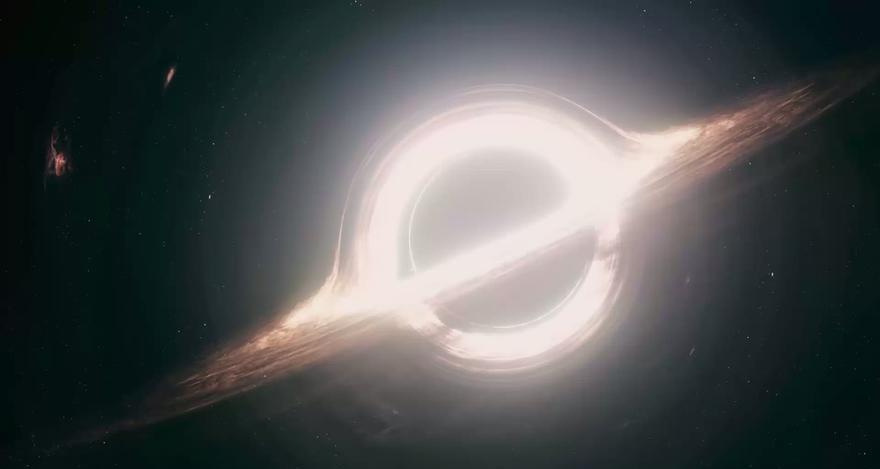
The “docking moment,” with its visual effects paired with Hans Zimmer’s ear-melting score halfway through Christopher Nolan’s arresting direction, is considered the ultimate highlight by many Interstellar fans. But, what personally took my breath away at the cinemas, and will end up being very high on my year-end list of awestruck theatre moments, was something that happens towards the end, “the big reveal” as it were. Obviously, if you have managed to still not see Interstellar, definitely stop reading this right now. But, if you have, then this should be familiar. Cooper (Matthew McConaughey) detaches from the main ship as a last attempt to collect the data from the black hole and save the human race. All his prayers made, his death an impending inevitability, he instead surprisingly finds himself in a multi-dimensional, time-warped “tesseract” (a.k.a. that colorful cube thingy) and realizes that he brought about his own future as his daughter Murphy’s (Mackenzie Foy) mysterious “ghost.” This moment of revelation should go down as one of the most unforgettable plot twists of the 21st century. The emotion, McConaughey’s performance, the visual effects, how it ties into the core of what Nolan’s sci-fi is truly about—the word ”awesome” can’t even do it justice. [Nik]
Journey to the West: Conquering the Demons – The Fish Demon
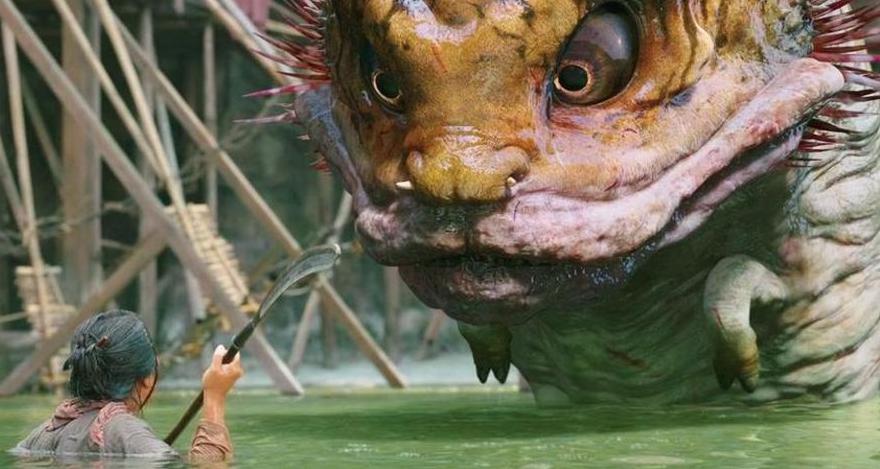
Stephen Chow, the director of Shaolin Soccer and Kung Fu Hustle, knows how to create grand visual comedy, combining lowbrow humour with pure, inventive spectacle. He’s credited as a co-director on Journey to the West: Conquering the Demons, but the opening sequence feels like it could only come directly from his brain. A fish demon terrorizes a small, ramshackle fishing village (think Waterworld), gobbling up anyone foolish enough to get near the water. Amateur demon hunter Xuan decides to take a crack at defeating the evil creature, resulting in one of the year’s best action sequences. The elaborately staged scene, including a bit with giant seesaws that feels straight out of silent-era comedy, shows the immense talent and precision on display, while the use of cheesy CGI and a fat suit as a punchline makes it hard not to burst out laughing at the lunacy on-screen. Journey to the West marks Chow’s first time back in the director’s chair since 2008, and it’s a reminder of how much his zany imagination has been missed. [C.J.]
Leviathan – Appeal Denied
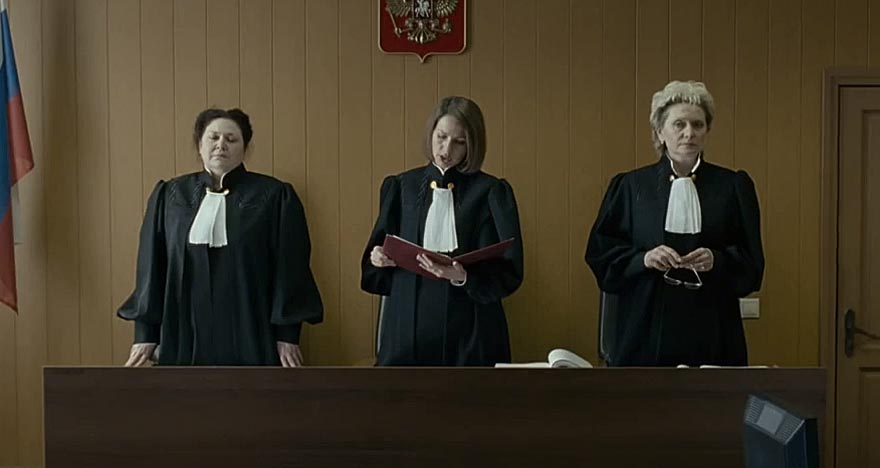
Andrey Zvyagintsev’s Leviathan is a cinematic goliath, and it feels almost wrong to single out just one scene, when part of power the film holds is how gracefully it weaves all of its scenes together into one knockout punch. That said, I want to climb every mountain top and scream the praises of this wondrous film, so I’m grabbing every chance I get to talk about it. A standout scene is Nikolai (Aleskey Serebryakov) visiting the court, after hearing that the Mayor’s (Roman Madyanov) plans of demolishing his house are moving forward, and listening to the judge deny his appeal by reading out a litany of rules and clauses, loopholes upon loopholes which Nikolai gravely realizes he’ll never be able to jump through. The speed at which she spits his virtual sentence out, Serebryakov’s powerhouse subtlety, Zvyagintsev’s choice to slowly track towards her in a shot that is unexpectedly long. It’s but one masterstroke in a film satiated in them, and the first moment that makes one realize how cinematically rich this film is. [Nik]
Nightcrawler – The Car Chase
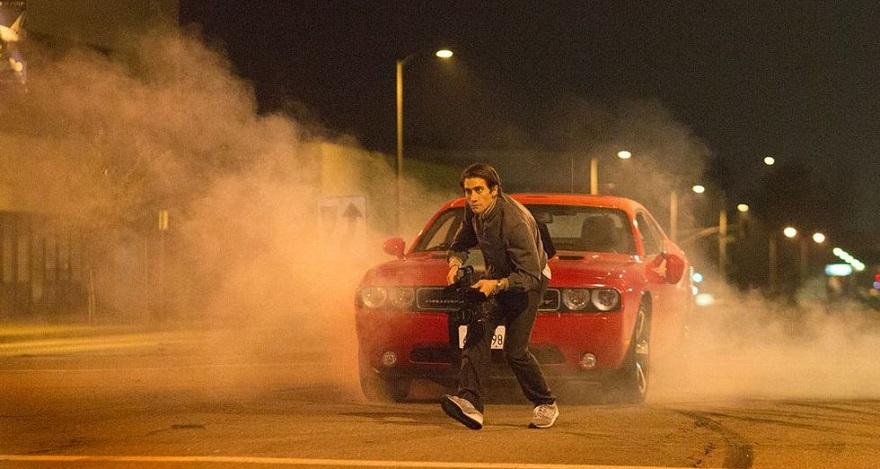
There have been plenty of car chases in the history of film, so at first glance it might seem unnecessary to single out this one, but the climactic chase in Dan Gilroy’s Nightcrawler is an exception. Why does this one stand out from the rest? Because of Lou Bloom’s (Jake Gyllenhaal) escalating obsession with capturing carnage on film to sell to the news. Bloom becomes more fanatical in his quest to capture great footage at blood-filled crime scenes, even going so far as to move a body so he can get a better angle. In the final act, Bloom deliberately creates a showdown between two dangerous criminals and police, and once the battle starts the film goes full throttle. The energy and intensity of the car chase is a massive expulsion of all the obsession brewing under Bloom’s façade the entire time. People die in the chase because of Bloom’s unsympathetic and greedy decision-making; but what does Louis think? All he cares about is if it looked good on camera. [Blake]
Nymphomaniac: Volume I – Mrs. H
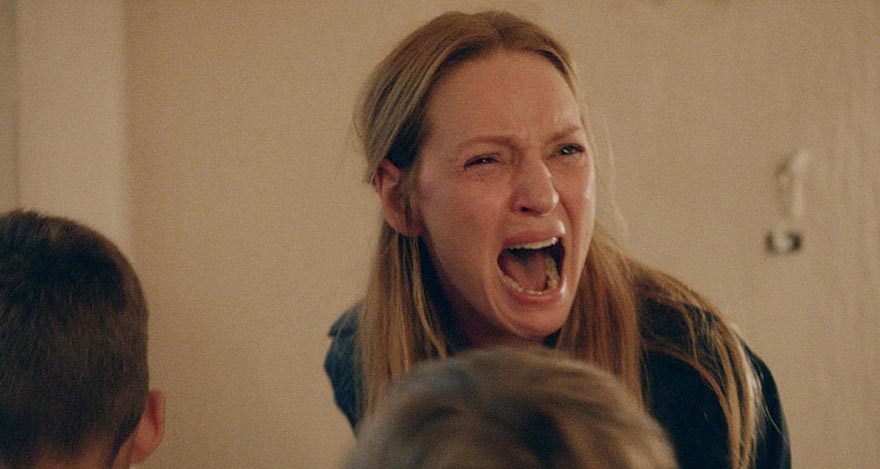
The first part of Lars Von Trier’s epic, explicit saga of Joe, the titular sex addict (played in this scene by Stacy Martin) has plenty of sexual depravity going on, but the film’s knockout sequence doesn’t have anyone baring skin. In a chapter titled “Mrs. H,” one of Joe’s regular flings comes to her place with his bags. He’s left his wife and children, ready to finally come live with Joe. She isn’t actually interested in this man, but that’s the least of her problems. Suddenly the man’s wife (Uma Thurman, who needs to work more with Von Trier) shows up with their kids, letting herself in and unleashing a firestorm of emotions on Joe and her husband. The scene is Von Trier in top form: funny, unbearable, sad, provocative, and riveting all at once. It’s a sequence that lingers all the way through to the next volume, and while the rest of the film offers plenty to like, nothing comes close to matching the power of “Mrs. H.” [C.J.]
Rosewater – First Interrogation
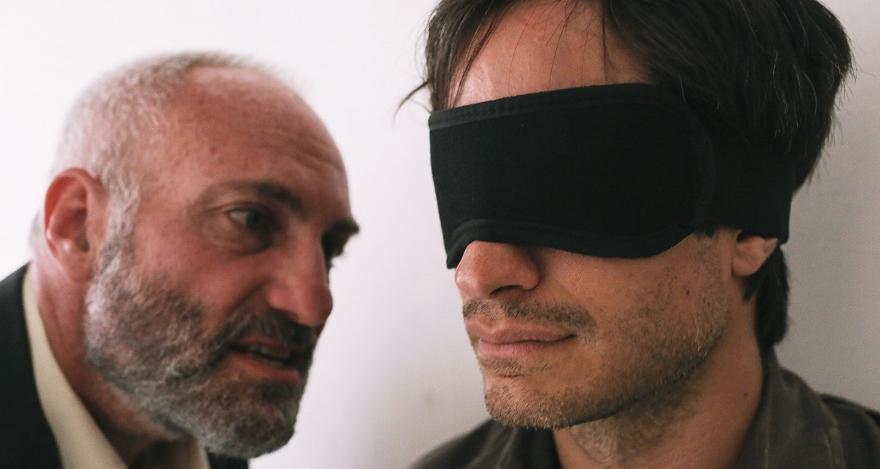
When Maziar Bahari is first taken in by the Iranian government and questioned about his involvement covering the presidential election, it seems like a joke. Certainly, he’s not an American spy as he’s being accused. We’ve seen his incredible attempt at trying to stay unbiased while still being inquisitive. But his accusers are wrapped up in silly questions over his possession of Italian art films and misunderstand his appearance on a satirical political show. Javadi, his interrogator, seems like a brutish buffoon who will easily get his comeuppance. But then Javadi leans into Bahari, lowers his voice and changes his expression. He asks Bahari why he talks about Americans and Iranians as if they are similar. Suddenly, the entire mood of the scene and the film changes from a fish-out-of-water comedy to something much more serious. In a simple character moment, we understand that Javadi isn’t a clown or a buffoon, but a very serious man who is hurt and angered. He’s not just a powerful captor, but a wounded animal who poses a legitimate threat to Bahari’s freedom. There are louder, more dramatic interrogation scenes in Rosewater, but none crystallize the complex political environment as much as this moment. [Aaron]
Snowpiercer – The Classroom
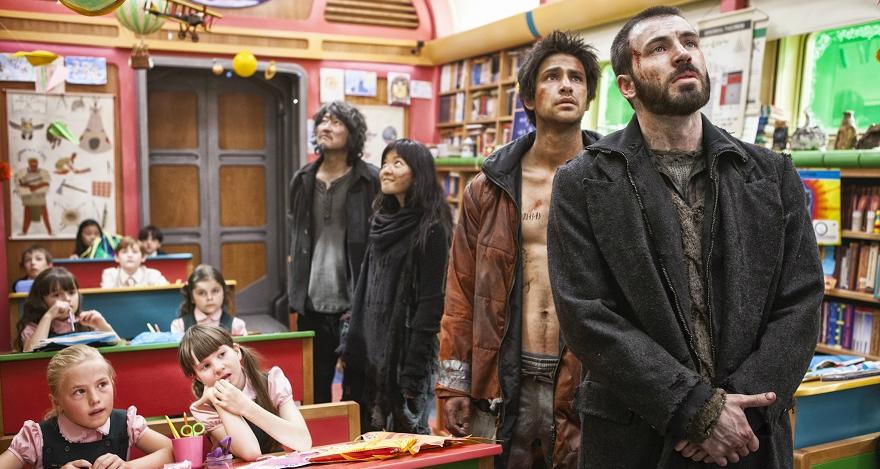
The Snowpiercer classroom scene is a bit like the “Pay no attention to that man behind the curtain,” moment from The Wizard of Oz. It begins the unmasking of the surreal world brought to life by Bong Joon-ho in an abrupt shift of tone. Lead by an absolutely zany performance from Alison Pill, the schoolteacher guides her young class through ritualistic songs praising the train’s mighty engine and its creator Wilford. Sure, the scene’s use of propaganda as educational material serves for a convenient exposition dump, but the colorful classroom and its blissfully ignorant children occupants add a moment of levity between the movie’s frequent brutality that manages to somehow feel crazier than many of the story’s insane twists. This scene turns swiftly brutal too, after Teacher retrieves a hidden automatic gun only to be dispatched by a swiftly thrown knife. All of it is mesmerizing and bizarrely fun. [Zachary]
Stray Dogs – Final 2 Shots
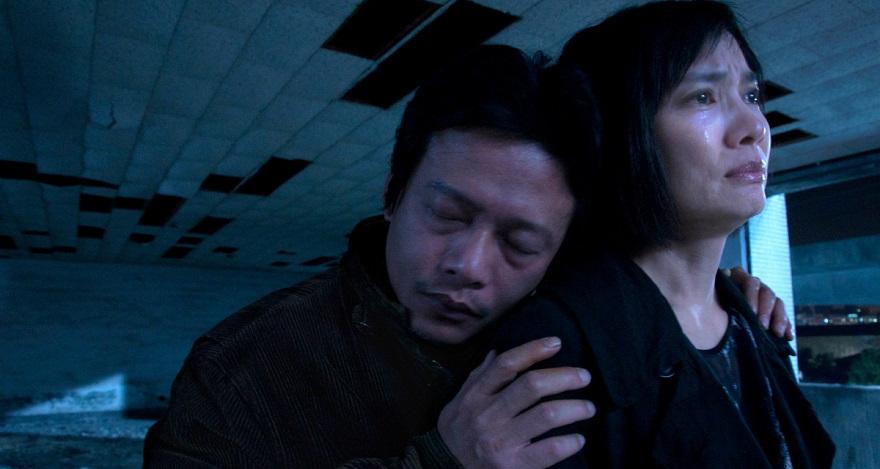
Anyone familiar with Tsai Ming-Liang knows how duration plays a vital part in his work. I saw Stray Dogs in theatres last year during its festival run, hopeful that Tsai’s self-declared final film would have him close off his filmmaking career on a strong note. I did not expect something as powerful as the film’s final two scenes, possibly the best work Tsai has ever done, to come from it. It’s hard to explain exactly why the ending has the power of an emotional sledgehammer without getting into too much detail, so I’ll stick to the facts. Shooting on digital instead of film, Tsai no longer has the limitation of a film reel to stop him from rolling. The penultimate shot lasts for close to 15 minutes, and the next shot lasts closer to 10. The extended length turns both shots into something constantly changing with each minute, an engrossing and ultimately transcendent experience. Few films have moved me the same way as those final minutes of Stray Dogs. I’m sure that only a few films ever will. [C.J.]
Two Days, One Night – Meeting Timur
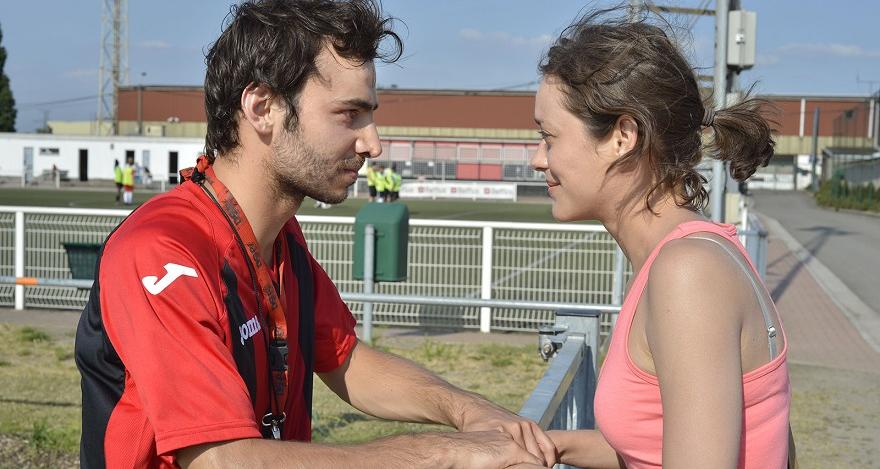
Marion Cotillard’s Sandra spends the length of Two Days, One Night attempting to convince a slew of co-workers to give up a significant bonus which will allow her to retain her job. The task is uncomfortable, and for Sandra incredibly anxiety-provoking, especially after her first couple of face-to-face interactions with co-workers don’t end in her favor; however, one excursion provides Sandra hope, and gives Two Days, One Night a much needed release of tension early in the film. As Sandra starts to hesitantly ask for empathy, becoming accustomed to the routine of being turned down by her colleagues, Timur instead is the one to break down into tears. He confesses that the decision to take his bonus rather than fight for his job has been haunting him. To Sandra’s surprise, Timur is relieved to have the opportunity she’s provided him, so much so that he’s even agreed to call another one of their co-workers. The scene comes unexpectedly, but is a beautiful and heartfelt moment that sets Two Days, One Night into motion. [Zachary]
Watchers of the Sky – Tycho Brahe
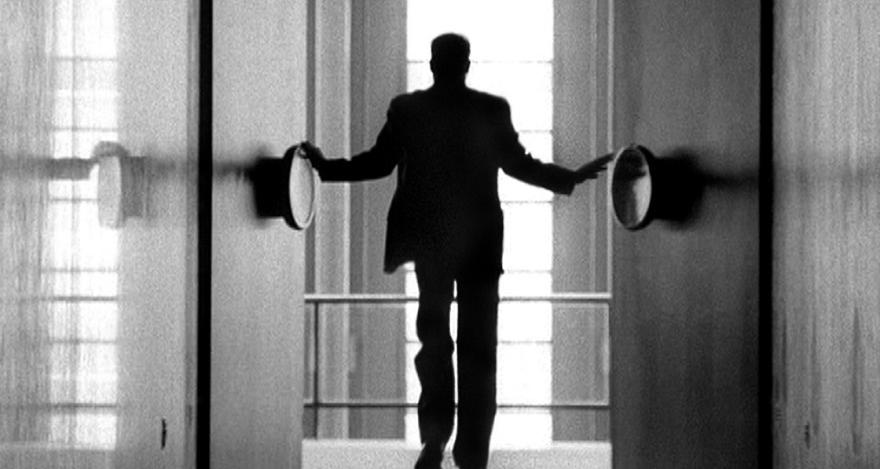
At the end of Watchers in the Sky, one of the documentary’s subjects relates a story about the 16th century astronomer Tycho Brahe. Brahe spent decades observing the stars and their position in the sky, writing his observations down every night. When someone asked Brahe what the purpose of his work was he said he didn’t know, but he was sure that, when someone does figure it out, he’ll have saved them several decades worth of work. And sure enough, Brahe’s measurements ended up being used by the first astronauts on the moon. It’s a moving, goosebump-inducing sequence because of how perfectly it ties into the film’s subject. Following different people fighting to end genocide, Watchers of the Sky commends them for their hard, thankless efforts. None of these people might ever see their goals fully realized, but their work will help make it easier for whoever ends up carrying their torch. It’s a level of selflessness that can inspire chills. [C.J.]
Whiplash – The Concert

If one thing’s obvious from Damien Chazelle’s 2nd film Whiplash, it’s the director’s impeccable sense of timing. The film moves along at a quick pace, settling into a rhythm of highs and lows for Miles Teller’s lead character Andrew. It’s in the film’s exhilarating finale that Chazelle allows his movie to hit the crescendo (Warning: Spoilers ahead). As Andrew performs with a band of professionals lead by the abusive conductor he’s just screwed over, he finds out Fletcher has set him up for disaster by not giving him sheet music to play. Andrew fumbles through one song so spectacularly that he leaves the stage out of embarrassment; however, just as you’ve become ready to accept this downer ending, Andrew storms back onto the stage. He interrupts Fletcher’s preamble with a energetic jazz beat and leads the band into an electric performance of “Caravan,” highlighted by a captivating drum solo. Andrew’s talent shines through so undeniably that he even wins over Fletcher. It’s an intensely visceral, satisfying moment that deserves a standing ovation. [Zachary]
What Else?
Working on this feature was like dealing with an embarrassment of riches. We could keep going on, talking about dozens of other scenes that left some sort of impact on us this year, but we all have our limits. In some cases it was simply too hard to pick one scene out of a film that contained so many amazing moments, like Under the Skin, A Spell to Ward off the Darkness and Winter Sleep. While we talked about the heart-pounding car chase in Nightcrawler, an earlier scene where Jake Gyllenhaal and Rene Russo “negotiate” over dinner, is also notably skin-crawling. 22 Jump Street wasn’t as funny as its predecessor but its end credits, a hilarious montage of potential sequels, was ingenious; the ending revelation of The Overnighters packs a wallop, tragically shedding everything that came before it in a new light; and the moment when Jean-Luc Godard “splits” his 3D cameras in Goodbye to Language 3D is, simply put, something that’s never been done in cinema before. Want to share the love of a moment we picked? Want to let us know how wrong we are for not including a scene you loved? Let us know what your favorite movie moments of 2014 are, and here’s hoping 2015 brings us many more unforgettable sequences.
